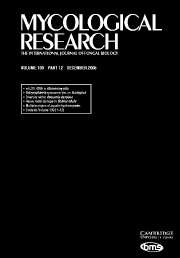Crossref Citations
This article has been cited by the following publications. This list is generated based on data provided by
Crossref.
Schnabel, Guido
and
Jones, Alan L.
2001.
The 14α-Demethylasse(CYP51A1) Gene is Overexpressed in Venturia inaequalis Strains Resistant to Myclobutanil.
Phytopathology®,
Vol. 91,
Issue. 1,
p.
102.
Cools, H. J.
Ishii, H.
Butters, J. A.
and
Hollomon, D. W.
2002.
Cloning and Sequence Analysis of the Eburicol 14 α‐Demethylase Encoding Gene (CYP51) from the Japanese Pear Scab Fungus Venturia nashicola.
Journal of Phytopathology,
Vol. 150,
Issue. 8-9,
p.
444.
Karaoglanidis, G. S.
Menkissoglu‐Spiroudi, U.
and
Thanassoulopoulos, C. C.
2003.
Sterol Composition of DMI‐Resistant and ‐Sensitive Field Isolates of Cercospora beticola.
Journal of Phytopathology,
Vol. 151,
Issue. 7-8,
p.
431.
Kagan, Isabelle A.
Michel, Albrecht
Prause, Anja
Scheffler, Brian E.
Pace, Pat
and
Duke, Stephen O.
2005.
Gene transcription profiles of Saccharomyces cerevisiae after treatment with plant protection fungicides that inhibit ergosterol biosynthesis.
Pesticide Biochemistry and Physiology,
Vol. 82,
Issue. 2,
p.
133.
Luo, Chao-Xi
and
Schnabel, Guido
2008.
Adaptation to Fungicides in Monilinia fructicola Isolates with Different Fungicide Resistance Phenotypes.
Phytopathology®,
Vol. 98,
Issue. 2,
p.
230.
BOWEN, JOANNA K.
MESARICH, CARL H.
BUS, VINCENT G. M.
BERESFORD, ROBERT M.
PLUMMER, KIM M.
and
TEMPLETON, MATTHEW D.
2011.
Venturia inaequalis: the causal agent of apple scab.
Molecular Plant Pathology,
Vol. 12,
Issue. 2,
p.
105.
Liu, Xin
Yu, Fangwei
Schnabel, Guido
Wu, Jianbing
Wang, Zhengyi
and
Ma, Zhonghua
2011.
Paralogous cyp51 genes in Fusarium graminearum mediate differential sensitivity to sterol demethylation inhibitors.
Fungal Genetics and Biology,
Vol. 48,
Issue. 2,
p.
113.
Thakur, Karnika
Chawla, Vandna
Bhatti, Shammi
Swarnkar, Mohit Kumar
Kaur, Jagdeep
Shankar, Ravi
Jha, Gopaljee
and
Stajich, Jason E.
2013.
De Novo Transcriptome Sequencing and Analysis for Venturia inaequalis, the Devastating Apple Scab Pathogen.
PLoS ONE,
Vol. 8,
Issue. 1,
p.
e53937.
Yarullina, L. G.
Kasimova, R. I.
Kuluev, B. R.
Surina, O. B.
Yarullina, L. M.
and
Ibragimov, R. I.
2014.
Comparative Study of Bunt Pathogen Resistance to the Effects of Fungicides in Callus Co-Cultures <i>Triticum aestivum</i> with Tilletia caries.
Agricultural Sciences,
Vol. 05,
Issue. 10,
p.
906.
Ziogas, Basil Nicholas
and
Malandrakis, Anastasios Andreas
2015.
Fungicide Resistance in Plant Pathogens.
p.
199.
Chen, Shuning
Yuan, Nannan
Schnabel, Guido
and
Luo, Chaoxi
2017.
Function of the genetic element ‘Mona’ associated with fungicide resistance in Monilinia fructicola.
Molecular Plant Pathology,
Vol. 18,
Issue. 1,
p.
90.
Chen, Shuning
Wang, Yunyun
Schnabel, Guido
Peng, Congyue Annie
Lagishetty, Satyanarayana
Smith, Kerry
Luo, Chaoxi
and
Yuan, Huizhu
2018.
Inherent Resistance to 14α-Demethylation Inhibitor Fungicides in Colletotrichum truncatum Is Likely Linked to CYP51A and/or CYP51B Gene Variants.
Phytopathology®,
Vol. 108,
Issue. 11,
p.
1263.
Muchembled, Jérôme
Deweer, Caroline
Sahmer, Karin
and
Halama, Patrice
2018.
Antifungal activity of essential oils on two Venturia inaequalis strains with different sensitivities to tebuconazole.
Environmental Science and Pollution Research,
Vol. 25,
Issue. 30,
p.
29921.
Chen, Shuning
Schnabel, Guido
Yuan, Huizhu
and
Luo, Chaoxi
2019.
LAMP detection of the genetic element ‘Mona’ associated with DMI resistance in Monilinia fructicola.
Pest Management Science,
Vol. 75,
Issue. 3,
p.
779.
Desmyttere, Hélène
Deweer, Caroline
Muchembled, Jérôme
Sahmer, Karin
Jacquin, Justine
Coutte, François
and
Jacques, Philippe
2019.
Antifungal Activities of Bacillus subtilis Lipopeptides to Two Venturia inaequalis Strains Possessing Different Tebuconazole Sensitivity.
Frontiers in Microbiology,
Vol. 10,
Issue. ,
Wang, Jin
Shi, Dongya
Wei, Lingling
Chen, Wenchan
Ma, Weiwei
Chen, Changjun
and
Wang, Kai
2020.
Mutations at sterol 14α‐demethylases (CYP51A&B) confer the DMI resistance in Colletotrichum gloeosporioides from grape.
Pest Management Science,
Vol. 76,
Issue. 12,
p.
4093.
Cordero‐Limon, Laura
Shaw, Michael W
Passey, Thomas AJ
Robinson, Joyce D
and
Xu, Xiangming
2021.
Cross‐resistance between myclobutanil and tebuconazole and the genetic basis of tebuconazole resistance in Venturia inaequalis.
Pest Management Science,
Vol. 77,
Issue. 2,
p.
844.
Botcazon, Camille
Bergia, Thomas
Lecouturier, Didier
Dupuis, Chloé
Rochex, Alice
Acket, Sébastien
Nicot, Philippe
Leclère, Valérie
Sarazin, Catherine
and
Rippa, Sonia
2022.
Rhamnolipids and fengycins, very promising amphiphilic antifungal compounds from bacteria secretomes, act on Sclerotiniaceae fungi through different mechanisms.
Frontiers in Microbiology,
Vol. 13,
Issue. ,
Heaven, Thomas
Armitage, Andrew D.
Xu, Xiangming
Goddard, Matthew R.
and
Cockerton, Helen M.
2023.
Dose-Dependent Genetic Resistance to Azole Fungicides Found in the Apple Scab Pathogen.
Journal of Fungi,
Vol. 9,
Issue. 12,
p.
1136.
Leconte, Aline
Jacquin, Justine
Duban, Matthieu
Deweer, Caroline
Trapet, Pauline
Laruelle, Frédéric
Farce, Amaury
Compère, Philippe
Sahmer, Karin
Fiévet, Valentin
Hoste, Alexis
Siah, Ali
Lounès-Hadj Sahraoui, Anissa
Jacques, Philippe
Coutte, François
Deleu, Magali
and
Muchembled, Jérôme
2024.
Deciphering the mechanisms involved in reduced sensitivity to azoles and fengycin lipopeptide in Venturia inaequalis.
Microbiological Research,
Vol. 286,
Issue. ,
p.
127816.


